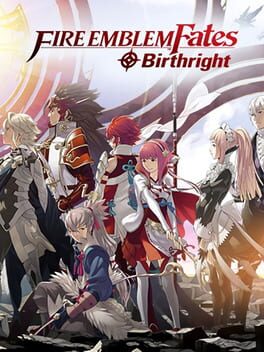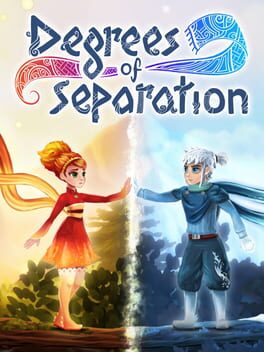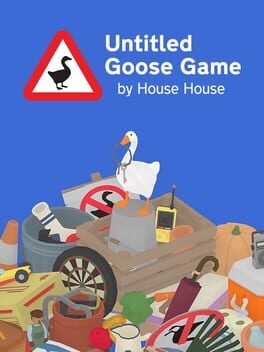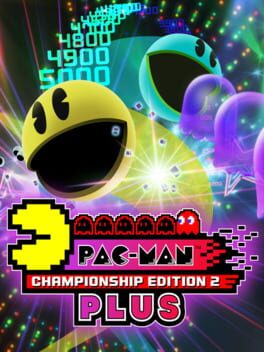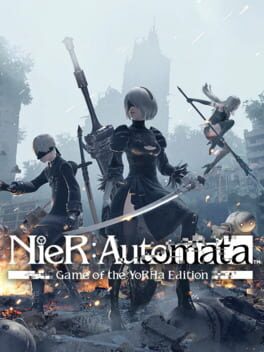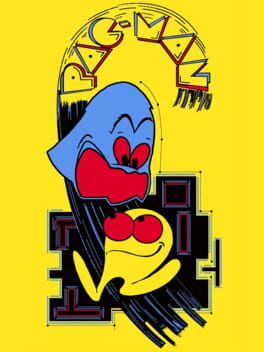pikachucet
Bio
Nothing here!
Badges

2 Years of Service
Being part of the Backloggd community for 2 years
Favorite Games
006
Total Games Played
000
Played in 2024
000
Games Backloggd
Recently Reviewed See More
This review contains spoilers
This game is the pinnacle of Japanese RPGs. I don't know how else to put it…one day this game just randomly caught my interest, and I really wanted to play it. I like existentialism and I like robots, so naturally I'd like this game. After just a few days of owning this game it already gripped me. The gameplay, the story, the beautiful yet broken world, you can get a bad ending by eating mackerel (no that is not a joke), 2B IS REALLY COOL OH MY GOD I CAN'T PUT INTO WORDS HOW COOL I THINK 2B IS SHE MAKES THE GAME GREAT JUST BY BEING THERE, and it's the only game so far to make me downright sob. Video games have made me cry before, like Fire Emblem Fates, Persona 3, Yakuza 0 and Super Mario Galaxy, which I honestly did not see coming, but where they left me a little teary eyed, I was left bawling by NieR: Automata. Whilst the English voice acting can sound a bit generic in the same way English dubs of Japanese media tend to be, I feel like the voice acting is also what carries the emotion of the game's scenes. The performances of Kira Buckland as 2B and Kyle McCarley as 9S when they're both lamenting the other android's death in the first and second half of the game respectively hit really, REALLY hard. These Voice Actors are really good at crying. It's oddly arty for a AAA game. And I don't just mean arty in the way that games like Breath of the Wild and Tears of the Kingdom are arty, where the game is aesthetically beautiful. I mean, it IS, the environments, particularly the ruins of the city reclaimed by nature in the absence of humanity, are stunning, but it's more than that. It's arty in the sense that it's experimental, and tackles themes you'd be hard pressed to find in other games like it. It's a game about existential dread, the Death of God, trying to find a meaning to one's existence and the pain that comes from being…well, NieR: Automata is about the pain that comes from simply being.
It can be very on the nose. Sometimes in ways that I like-I love that the first of the game's three protagonists is called 2B, that her partner is called 9S (which is a pun on "non esse", not to be) and that the third protagonist who betrayed the organisation 2B and 9S are fighting for is called A2 (Et tu Brute?Wow, what a trully horrible thing you've done. #Bravo you coward.), it's the same school of naming robots as the robot dog K9 from Doctor Who where you put a letter and a number together to make a pun and I absolutely love it-but sometimes it's on the nose in ways that I don't like-the villains being called Adam and Eve is just kind of cliche to me. It's got some more glaring issues too unfortunately. Aside from being occasionally pretentious with how it names its characters, the lack of autosave can be frustrating, 9S' hacking minigames can get repetitive, and the last 2B segment in the third playthrough, whilst intentionally unfair and gruelling (perhaps another way the game depicts the unfair nature of the world), goes too far if you ask me, and I'm not sure if I should praise the game for effectively conveying its artistic intent or be angry at it for the artistic intent being at the expense of MY sanity! Something else I don't like is the way 9S's Operator, 21O, gets used in the story. Whilst you do get some indication that she wants to have a family in Route B, said indication comes in the form of a message she sends 9S in his mailbox, and it doesn't get brought up again until just before she dies, and during the boss fight with her. It would have probably been really hard hitting if the game had actually gotten me invested in 21O's story, as opposed to bringing it up once in an area that's easily missed and making it seem like it's a character trait that came completely out of nowhere. This would have been a much harder hitting plot point if it revolved around 2B's relationship with her Operator, 6O, who’s very heavily implied to have a crush on 2B in her route and who you can complete a side quest for which gives her a goodbye scene at the start of the third playthrough. But again, why is it so easy to miss? If you want to make me feel sad for character deaths in video games and make those deaths a major part of the plot, don't make seeing the reasons why I should feel sad for those characters OPTIONAL. Reading about 6O's death made me feel more sad than having to fight 21O, which I think is a sign of bad writing, or at the very least poor execution of potentially very emotional writing.
Still, I can't say I've played many games that have made me sob…twice. And that makes up for the occasional dips in the story's quality. Ending A was the first scene in NieR: Automata, and any video game for that matter, to make me sob, which as mentioned previously is in no small part due to Kira Buckland's performance as 2B, but also due to how tragic the story is in a way that feels very specific to robot characters like 2B and 9S, where 2B has known 9S for a long time but because he keeps dying over and over again (often by 2B's hand as the game later reveals) and having his memory wiped, up until Ending A and B, 9S could never know her. And then Ending E, Oh GOD Ending E. The best part of the game for sure in how the rest of the game beforehand sets itself up as feeling rather cynical and often ending in tragedy, before becoming a beautiful rejection of nihilism with the message that, even when it's naïve and unreasonable to think so, the hope of the possibility of a better outcome is something to be believed in. I never thought an ending credits sequence in a video game would ever leave me with tears streaming out of my eyes, but here we are. This game made me feel a way that no other video game has made me feel. It is without doubt one of the most beautiful games I've ever played. Also you can get a bad ending by eating mackerel. I was still crying a few minutes after I turned the game off after beating every path, and I was still laughing for a few minutes after I got the Mackerel Ending. If not for Untitled Goose Game, the title of my favourite video game ever made would likely go to NieR: Automata.
It can be very on the nose. Sometimes in ways that I like-I love that the first of the game's three protagonists is called 2B, that her partner is called 9S (which is a pun on "non esse", not to be) and that the third protagonist who betrayed the organisation 2B and 9S are fighting for is called A2 (Et tu Brute?
Still, I can't say I've played many games that have made me sob…twice. And that makes up for the occasional dips in the story's quality. Ending A was the first scene in NieR: Automata, and any video game for that matter, to make me sob, which as mentioned previously is in no small part due to Kira Buckland's performance as 2B, but also due to how tragic the story is in a way that feels very specific to robot characters like 2B and 9S, where 2B has known 9S for a long time but because he keeps dying over and over again (often by 2B's hand as the game later reveals) and having his memory wiped, up until Ending A and B, 9S could never know her. And then Ending E, Oh GOD Ending E. The best part of the game for sure in how the rest of the game beforehand sets itself up as feeling rather cynical and often ending in tragedy, before becoming a beautiful rejection of nihilism with the message that, even when it's naïve and unreasonable to think so, the hope of the possibility of a better outcome is something to be believed in. I never thought an ending credits sequence in a video game would ever leave me with tears streaming out of my eyes, but here we are. This game made me feel a way that no other video game has made me feel. It is without doubt one of the most beautiful games I've ever played. Also you can get a bad ending by eating mackerel. I was still crying a few minutes after I turned the game off after beating every path, and I was still laughing for a few minutes after I got the Mackerel Ending. If not for Untitled Goose Game, the title of my favourite video game ever made would likely go to NieR: Automata.
Pac-Man is perhaps the first case of a near-perfect video game…but that's only really because there's nothing actually that wrong with it, it's a bit too small for too much error if that makes sense, especially given it's the oldest game out of my long list of games I'd consider to be the greatest. Only real flaw I'd say it has that would stop it from achieving perfection is how gaining extra lives works. Or rather, AN extra life. One. Because while you get an extra life upon earning 1000 points, you don't get an extra life for every thousand points you get-only the first time you get a thousand points. That aside, the game was excellent for the time (which was essentially the Classical Antiquity Era for video games) and still holds up today. This and Galaxian were very colourful compared to other games of the era and considering the limitations of both its graphics and sound I think Pac-Man genuinely still looks incredibly vibrant and sounds so incredibly satisfying over 40 years later. I believe this is also the first time a video game had characters with distinct names, designs and personalities, and I love how the personalities of Pac-Man, Blinky, Pinky, Inky and Clyde can be understood just from their behaviour in game. Pac-Man is, very clearly, constantly hungry, and nothing can seem to quench that hunger. Blinky is straightforward and more aggressive than the other Ghosts, simply following you from behind but also getting faster the closer you get to finishing the stage. Pinky is the most cunning Ghost, as her strategy is to ambush you from the front rather than attack you from behind like the other Ghosts, often leading to her trapping you between her and another Ghost. Inky is a bit shy but also unpredictable, as he keeps his distance from you unless Blinky is nearby, and Clyde is stupid and cowardly, since he runs away from you upon getting close. It's one thing for a video game character to have an interesting and fun personality through writing in games that are actually written-it's another thing for an Arcade game from 1980 with no story or dialogue to show the characters' personality from how they act in the game itself! It's also the basis for how Pac-Man and The Ghost Gang are written in most subsequent Pac-Man media (although this doesn't apply so much to Pinky, who's not really got a consistent personality across the later games outside of her behaviour in gameplay and her being the Girl Ghost).
It's weird how I can talk so much about this game isn't it?
It's weird how I can talk so much about this game isn't it?
Trigger Warning: Rape, Attempted Suicide, Homophobia, Pedophilia and Transphobia. If any of these upset you, please be prepared if you decide to continue reading.
Ooooh boy, reviewing this will be fun.
OK, so Persona 5/Royal is one of my favourite games ever made...but I am embarrassed to say that it is. The gameplay, visual design, characters, voice acting and soundtrack are all mostly amazing, but the writing of this game is so horrible and utterly tone deaf that it legitimately weighs down the experience. And the fact that this game is praised so much for its writing makes very little sense to me, considering that this is one of the most badly written games I've ever played, and considering the state of video game writing that's quite an achievement isn't it?
So as for stuff that the game does well, a good place to start would be the gameplay. The game is very satisfying to play and I had so much fun during fights that I never felt like I had to grind, and while not as well done as the negotiation mechanic from the mainline Shin Megami Tensei games and Persona 2: Innocent Sin, I still liked the idea that I didn't have to kill every enemy I came across. The soundtrack is one of the best in the business, and some of the tracks felt like they were telling a story and describing characters without having to use lyrics (the best examples of this are "Layer Cake" and "The Days When my Mother was There"). It also reminded me of Club Penguin, so that was a plus. The voice acting is incredible, with good examples like Max Mittelman as Ryuji. Mathew Mercer as Yusuke, Erica Lindbeck as Futaba, Robby Daymond as Akechi and the late Billy Kametz as Dr. Maruki, but for as annoying as he is to some people I really want to highlight Cassandra Lee Morris' performance as Morgana. Lee Morris is very good at sounding cat-like. Morgana's voice has inflections to it that make it sound like he's meowing his lines, and aside from that Lee Morris' actual impressions of a cat meowing are scarily good. One of my favourite voice clips in the game is of Morgana's laugh, and how it's laugh that fully morphs into a meow at the very end. The characters, unlike the story they're written in, are generally really well done. When the game isn't treating them like shit Ryuji and Ann are well done characters (also helped by the voice acting) and I love how they and Morgana bounce off of each other early on in the game. I also like the ransom note design of the UI. The game deserves an award for its UI alone.
As for things I had mixed thoughts on, there's really only one thing to mention, which is Futaba Sakura, who seems like she's meant to be an analogy for an autistic person. As an autistic person myself, I'm not sure how to feel about this. On one hand Futaba is a well written character and unlike some other characters the game is always sensitive when talking about her trauma, and rather than making her character arc about her trying to be "normal", the game instead does the opposite, which is a relief as considering how tone deaf Persona 5 can get that would've been a very easy hole for the game to fall down, and I appreciate that. Her awkwardness around other people and interest in video games is also something I saw myself in. However she does also seem to be based on several stereotypes of autistic people that aren't particularly harmful but cliche and not really accurate to what autistic people such as myself are actually like. Futaba is the hacker of the group, which plays into the stereotype that autistic people are all really good with programming. This assumption doesn't prove true for all autistic people, and while I myself want to be good at programming, more often than not I find the idea of coding too daunting. I took a programming course in my last year of school and I could not for the life of me pay too much attention, which partly plays into the lessons being taught online which lead me to getting distracted more often, but also that programming isn't something that comes to me naturally like people may assume it does. My hyperfixations are moreso on media, which Futaba also does and which I found more accurate (I mean as of writing this I've re-entered my Pac-Man phase and have played almost nothing but Pac-Man Museum+ for the past week and ever since seeing the horrible dub of Pokémon the Movie: Mewtwo Strikes Back and how it ruined the meaning of the Japanese version the film pops into my head at least once every day, so that should be an indication of how I hyper-fixate on things). I do also think that her "quirky" (if that's the right word) personality also plays off of some stereotypes, although again I appreciate that the game isn't ableist. One last thing about Futaba is how Erica Lindbeck has apparently said that she tried to make Futaba sound like she was on the autism spectrum when she was voicing her, which is...you can't "sound autistic." If you talk to an autistic person you aren't going to be able to tell that they're autistic from their voice. I don't even think you can hear it in Futaba's voice either. What on earth did she mean? I really feel like Linbeck meant well when she did this but it's very weird and again, I have no idea how to feel about it.
OK now for stuff that I just downright hate. Persona 5's supposed theme is rebellion, and fighting back against society. However it also does this whilst containing some of the most insensitive cliches in anime and JRPGs. Despite the fact that you fight a pedophile as the first boss, the game loves to sexualise the underage characters and at some points this isn't only creepy but extremely disrespectful. Take Ann for example. Ann is a victim of sexual harassment and the reason she decides to rebel in the first place is in part due to her best friend being raped and then attempting to commit suicide. Despite this however for some ungodly reason the writers decided to make Ann the sexualised femme fetale character, which considering her backstory is incredibly contradictory. This isn't even mentioning how the cognitive version of Ann and even her best friend are extremely sexualised, which is supposedly meant to show how fucked up the boss is, but seems way more like an excuse to put in something for the middle aged devs and creepy fans to fap over, and the fact that they do that with a RAPE VICTIM is absolutely disgusting. It also doesn't help that after the game's first arc, Ann has absolutely no importance to the story other than to be the butt of creepy and often misogynistic jokes. This is not helped by the game allowing the 16-17 year old protagonist to fuck female characters much older than him. Aside from that, there's also how the game treats trans people and gay people. The game is very heteronormative and assumes that you are definitely straight, and the only time that gay people are ever actually shown is with an incredibly homophobic caricature of a gay couple. They tried to tone them down in Royal but all this does is make them being stereotypes of gay people less obvious. There is also Lala Escargot, who is a caricature of a trans woman that characters also feel uncomfortable around. Diehard Persona 5 fans insist that Lala is actually a positive depiction of a trans woman, despite how blantly transphobic her design and voice acting are. It isn't even good for Japanese media, which is not well known for treating trans and LGBTQ+ characters well. Yakuza 3 and even the Pokémon games do a better job at portraying trans women, especially Yakuza. The fact that the game has these tasteless and offensive cliches is incredibly contradictory to it claiming to be a rebellious game. When it comes to actual social issues that the game tries to handle it takes far more of a liberal stance on them than a rebellious one. An actually rebellious game (such as Cloudpunk, an indie Cyberpunk game that's worth checking out) would handle the topics of police brutality, inequality and capitalism with complete opposition, wheras Persona 5 never addresses that the police may be an inherently corrupt organisation, never addresses capitalism in the slightest and doesn't touch upon inequality in Japanese society at all. Very little about this game is actually rebellious, and the fact that nobody warned me about these issues going into the game shocks me. That aside, the plot itself is not well written. The main cast is far too large and often the game has them standing around in the circle and saying essentially the same thing, randomly shifts the focus of the story near the end and is overall just not well written. The only part where I can say the writing improves is the Third Semester, likely because it's themes are philosophical rather than attempting to be social commentary that falls flat, and it's easily the most interesting part of the game. It's probably also better written since the story of the original Persona 5 was written by its director, Katsura Hashino, who really wants to write stories about social issues (but should NEVER be allowed to write games about social issues) and for Royal only served as a producer, having no hand in the writing. This isn't to say that the Third Semester's writing is amazing and it has its own issues but it's definitely better than the standard story.
Persona 5/Royal is an excellent game, but with how awful the writing is I seldom want to admit that it is. If you are interested in this game, proceed with caution. I cannot actively recommend that you play it.
Ooooh boy, reviewing this will be fun.
OK, so Persona 5/Royal is one of my favourite games ever made...but I am embarrassed to say that it is. The gameplay, visual design, characters, voice acting and soundtrack are all mostly amazing, but the writing of this game is so horrible and utterly tone deaf that it legitimately weighs down the experience. And the fact that this game is praised so much for its writing makes very little sense to me, considering that this is one of the most badly written games I've ever played, and considering the state of video game writing that's quite an achievement isn't it?
So as for stuff that the game does well, a good place to start would be the gameplay. The game is very satisfying to play and I had so much fun during fights that I never felt like I had to grind, and while not as well done as the negotiation mechanic from the mainline Shin Megami Tensei games and Persona 2: Innocent Sin, I still liked the idea that I didn't have to kill every enemy I came across. The soundtrack is one of the best in the business, and some of the tracks felt like they were telling a story and describing characters without having to use lyrics (the best examples of this are "Layer Cake" and "The Days When my Mother was There"). It also reminded me of Club Penguin, so that was a plus. The voice acting is incredible, with good examples like Max Mittelman as Ryuji. Mathew Mercer as Yusuke, Erica Lindbeck as Futaba, Robby Daymond as Akechi and the late Billy Kametz as Dr. Maruki, but for as annoying as he is to some people I really want to highlight Cassandra Lee Morris' performance as Morgana. Lee Morris is very good at sounding cat-like. Morgana's voice has inflections to it that make it sound like he's meowing his lines, and aside from that Lee Morris' actual impressions of a cat meowing are scarily good. One of my favourite voice clips in the game is of Morgana's laugh, and how it's laugh that fully morphs into a meow at the very end. The characters, unlike the story they're written in, are generally really well done. When the game isn't treating them like shit Ryuji and Ann are well done characters (also helped by the voice acting) and I love how they and Morgana bounce off of each other early on in the game. I also like the ransom note design of the UI. The game deserves an award for its UI alone.
As for things I had mixed thoughts on, there's really only one thing to mention, which is Futaba Sakura, who seems like she's meant to be an analogy for an autistic person. As an autistic person myself, I'm not sure how to feel about this. On one hand Futaba is a well written character and unlike some other characters the game is always sensitive when talking about her trauma, and rather than making her character arc about her trying to be "normal", the game instead does the opposite, which is a relief as considering how tone deaf Persona 5 can get that would've been a very easy hole for the game to fall down, and I appreciate that. Her awkwardness around other people and interest in video games is also something I saw myself in. However she does also seem to be based on several stereotypes of autistic people that aren't particularly harmful but cliche and not really accurate to what autistic people such as myself are actually like. Futaba is the hacker of the group, which plays into the stereotype that autistic people are all really good with programming. This assumption doesn't prove true for all autistic people, and while I myself want to be good at programming, more often than not I find the idea of coding too daunting. I took a programming course in my last year of school and I could not for the life of me pay too much attention, which partly plays into the lessons being taught online which lead me to getting distracted more often, but also that programming isn't something that comes to me naturally like people may assume it does. My hyperfixations are moreso on media, which Futaba also does and which I found more accurate (I mean as of writing this I've re-entered my Pac-Man phase and have played almost nothing but Pac-Man Museum+ for the past week and ever since seeing the horrible dub of Pokémon the Movie: Mewtwo Strikes Back and how it ruined the meaning of the Japanese version the film pops into my head at least once every day, so that should be an indication of how I hyper-fixate on things). I do also think that her "quirky" (if that's the right word) personality also plays off of some stereotypes, although again I appreciate that the game isn't ableist. One last thing about Futaba is how Erica Lindbeck has apparently said that she tried to make Futaba sound like she was on the autism spectrum when she was voicing her, which is...you can't "sound autistic." If you talk to an autistic person you aren't going to be able to tell that they're autistic from their voice. I don't even think you can hear it in Futaba's voice either. What on earth did she mean? I really feel like Linbeck meant well when she did this but it's very weird and again, I have no idea how to feel about it.
OK now for stuff that I just downright hate. Persona 5's supposed theme is rebellion, and fighting back against society. However it also does this whilst containing some of the most insensitive cliches in anime and JRPGs. Despite the fact that you fight a pedophile as the first boss, the game loves to sexualise the underage characters and at some points this isn't only creepy but extremely disrespectful. Take Ann for example. Ann is a victim of sexual harassment and the reason she decides to rebel in the first place is in part due to her best friend being raped and then attempting to commit suicide. Despite this however for some ungodly reason the writers decided to make Ann the sexualised femme fetale character, which considering her backstory is incredibly contradictory. This isn't even mentioning how the cognitive version of Ann and even her best friend are extremely sexualised, which is supposedly meant to show how fucked up the boss is, but seems way more like an excuse to put in something for the middle aged devs and creepy fans to fap over, and the fact that they do that with a RAPE VICTIM is absolutely disgusting. It also doesn't help that after the game's first arc, Ann has absolutely no importance to the story other than to be the butt of creepy and often misogynistic jokes. This is not helped by the game allowing the 16-17 year old protagonist to fuck female characters much older than him. Aside from that, there's also how the game treats trans people and gay people. The game is very heteronormative and assumes that you are definitely straight, and the only time that gay people are ever actually shown is with an incredibly homophobic caricature of a gay couple. They tried to tone them down in Royal but all this does is make them being stereotypes of gay people less obvious. There is also Lala Escargot, who is a caricature of a trans woman that characters also feel uncomfortable around. Diehard Persona 5 fans insist that Lala is actually a positive depiction of a trans woman, despite how blantly transphobic her design and voice acting are. It isn't even good for Japanese media, which is not well known for treating trans and LGBTQ+ characters well. Yakuza 3 and even the Pokémon games do a better job at portraying trans women, especially Yakuza. The fact that the game has these tasteless and offensive cliches is incredibly contradictory to it claiming to be a rebellious game. When it comes to actual social issues that the game tries to handle it takes far more of a liberal stance on them than a rebellious one. An actually rebellious game (such as Cloudpunk, an indie Cyberpunk game that's worth checking out) would handle the topics of police brutality, inequality and capitalism with complete opposition, wheras Persona 5 never addresses that the police may be an inherently corrupt organisation, never addresses capitalism in the slightest and doesn't touch upon inequality in Japanese society at all. Very little about this game is actually rebellious, and the fact that nobody warned me about these issues going into the game shocks me. That aside, the plot itself is not well written. The main cast is far too large and often the game has them standing around in the circle and saying essentially the same thing, randomly shifts the focus of the story near the end and is overall just not well written. The only part where I can say the writing improves is the Third Semester, likely because it's themes are philosophical rather than attempting to be social commentary that falls flat, and it's easily the most interesting part of the game. It's probably also better written since the story of the original Persona 5 was written by its director, Katsura Hashino, who really wants to write stories about social issues (but should NEVER be allowed to write games about social issues) and for Royal only served as a producer, having no hand in the writing. This isn't to say that the Third Semester's writing is amazing and it has its own issues but it's definitely better than the standard story.
Persona 5/Royal is an excellent game, but with how awful the writing is I seldom want to admit that it is. If you are interested in this game, proceed with caution. I cannot actively recommend that you play it.
